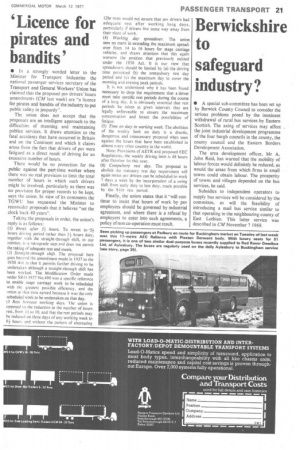'Licence for pirates and bandits'
Page 23

If you've noticed an error in this article please click here to report it so we can fix it.
• In a strongly worded letter to the Minister for Transport Industries the national passenger services secretary of the Transport and General Workers' Union has claimed that the proposed psv drivers' hours amendments (CM last week) are "a licence for pirates and bandits of the industry to put public safety in jeopardy".
The union does not accept that the proposals are an intelligent approach to the difficulties of manning and maintaining publice services. It draws attention to the fatal accidents that have occurred in Britain and on the Continent and which it claims arose from the fact that drivers of psv were fatigued as a direct result of driving for an excessive number of hours.
There would be no protection for the public against the part-time worker where there was no real provision to limit the total number of hours in which such drivers might be involved, particularly as there was no provision for proper records to be kept, says the union. In view of its comments the TGWU has requested the Minister to reconsider proposals that it believes "set the clock back 40 years".
Taking the proposals in order, the union's reply is as follows:
(I) Break after 54 hours. To revert to -54 hours driving period rather than 54 hours duty, together with the straight-through shift, in our opinion. is a retrograde step and does not permit the taking of adequate rest and meals.
(2) Straight-through shift. The proposal here goes beyond the amendment made in 1937 to the 1930 Act in that it permits further driving to be undertaken although a straight-through shift has been worked. The Modification Order made under SRO 1937 No,490 was a specific reference to enable stage carriage work to be scheduled with the greatest possible efficiency, and the union at that time agreed because it was the only scheduled work to be undertaken on that day.
(3 Rest between working days. The union is opposed to the reduction in the number of hours rest, from 11 to 10, and that the rest periods may be reduced on three clays of any working week to 84 hours and without the pattern of alternating 12hr rests would not ensure that psv drivers had adequate rest after working long days, particularly if drivers live some way away from their place of work.
(4) Working day spreadover. The union sees no merit in extending the maximum spreadover from 14 to 16 hours for stage carriage vehicles, and draws attention that this again worsens the position that previously existed under the 1930 Act. It is our view that spreadovers should be limited by (a) the driving time permitted (b) the compulsory rest day period and (c) the maximum day to cover the morning and evening peak periods.
It is not understood why it has been found necessary to drop the requirement that a driver must take specific rest periods during the course of a long day. It. is obviously essential that rest periods be taken at given intervals that are legally enforceable to ensure the maximum concentration and lessen the possibilities of fatigue.
(5) Time on duty in working week The abolition of the weekly limit on duty is a drastic, dangerous and unnecessary proposal when seen against the hours that have been established in almost every other country in the world.
Note: Provisions of AETR and proposed EEC Regulations. the weekly driving limit is 48 hours after October 1st this year.
(6) Compulsory rest day. The proposal to abolish the statutory rest day requirement will again mean psv drivers can be scheduled to work 7 days a week by the incorporation of a swing shift from early duty to late duty, made possible by the 8-i-hr rest period.
Finally, the union states that it "will continue to insist that hours of work by psv employees should be governed by industrial agreement, and where there is a refusal by employers to enter into such agreements, a policy of non co-operation must result.






















































































